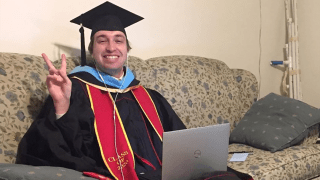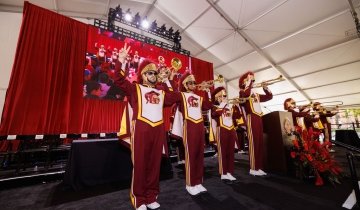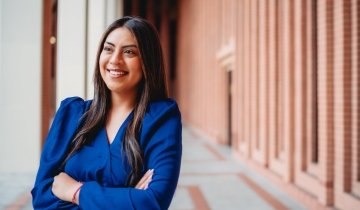In Dr. Seuss’ How the Grinch Stole Christmas, fresh off his overnight heist of Whoville’s myriad holiday trimmings, the Grinch listens for the sound of miserable villagers waking up to tragedy. Instead, he’s bewildered to find them singing, joyfully. “It came without ribbons,” he mutters to himself, “It came without tags. It came without packages, boxes or bags.”
Against the specter of the COVID-19 pandemic, USC Rossier graduated 300 doctoral students and 700 masters students this past Friday. And even without the usual regalia and tradition, students demonstrated the creativity, perseverance and spirit that highlighted past ceremonies. They earned the same “rights, privileges and responsibilities” bestowed to the scores of classes before them.
Even as social media posts carried common expressions of amusement and frustration—“I didn’t expect to be graduating like this”—the day still brought the usual flood of emotions too.
“I hope that your online experiences have opened your eyes to new possibilities in the way we teach, learn and lead,” said Dean Karen Symms Gallagher in remarks delivered online to the USC Rossier community. “Our adaptability, resilience and creativity will be more important than ever as we face the challenges of education in the 21st century.”
Behind the scenes
USC Rossier’s Celebration, a 15-minute online affair following the University’s virtual conferring of degrees, came together at an unprecedented pace.
(WATCH: The USC Rossier 2020 Celebration)
In normal years, Commencement planning for May starts as early as September, said Kenae Danley, Director of Special Events at USC Rossier. But this year, when USC implemented a work-from-home order on March 13 to stem the spread of the novel coronavirus, event directors were asked to halt commencement planning. That abruptly changed on April 22, when USC decided each school would do an online celebration to complement the university’s virtual ceremony.
“It was a huge pivot from a well-oiled, eight-month planning cycle to having just a few days to plan and just a few weeks to execute,” Danley said.
With a heavy focus on social media and video, the new plan also shifted a good deal of responsibility away from Danley and events assistant Australia Cazares and across several departments.
And then there was the technology. Even as each USC school weighed whether and how to use any number of streaming platforms, decisions had to be made fast.
“There are gaps from school to school in terms of what we have access to regarding graphic design, video and even bandwidth in house,” Danley said, “and that impacted what we could do and how fast we could execute.”
Graduates ready themselves
In only a few short days, the dean, student speakers and program governance chairs had each filmed short videos that were edited into messages to graduates, while community members flooded the #USCGrad and #RossierGrad hashtags with their thoughts and well-wishes.
Nancy Escobar, graduating with a master’s degree from the Education Counseling program, noted on Instagram her mixed emotions about attending a virtual celebration. President Carol Folt had made a promise that the university would eventually hold a full Commencement once it was safe to do so, and if Escobar had waited years for this moment, why not a few more months?
“I realized, however, that walking across a stage isn’t what made this moment special,” she wrote.
Others like Jackie Blanca, graduating from the Postsecondary Administration and Student Affairs master’s program (PASA), and Branden Grimmett, of the Educational Leadership EdD program, showed off the regalia they’d be wearing from home, while other students pretended to shake hands with Folt or improvised their own stages to walk across.
Whoville finds a way.
Danley said that the next traditional graduation ceremony could benefit from lessons learned in this year’s celebration. The personalized videos used in the celebration proved effective and fun, she says, and offered a new way to involve faculty, staff and graduates and their families across the globe.
As to whether next year’s Commencement has the same crowds and post-ceremony receptions, that remains to be seen.
“I personally love challenges as it allows us to grow and change in new ways,” Danley said. “However—it wouldn’t hurt to have a bit more time.”




